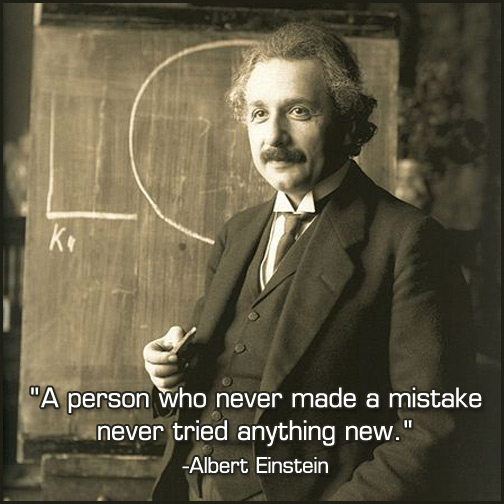
graphic © eminentlyquotable.com | photo – Wikipedia
“A person who never made a mistake never tried anything new.” – Albert Einstein
Researchers believe that what makes mistakes conducive to learning is the element of surprise upon finding out we are wrong. The brain does so sensitively that it manages to learn from mistakes in less than a second! But here’s the disclaimer: the ability to learn from mistakes varies between people. According to a study at Goldsmiths, University of London, some people will never learn.
It’s been said again and again that experience is the best teacher, but it turns out that it also depends on our mindset. A study published in Psychological Science finds that our perception on intelligence affects how our brain reacts to mistakes. People who think intelligence is malleable are better at learning from their mistakes compared to people who think intelligence is fixed! It holds true that “whether you think you can or think you can’t—you’re right,” a quote by Henry Ford.
The study showed that people who think they can learn from their mistakes successfully bounced back after an error. Their brains reacted positively to mistakes by sending a signal that says “I should pay more attention next time to avoid making the same error.” On the other hand, people with a different perception responded negatively by feeling stupid or mentally inadequate.
Here’s the thing: we avoid trying new things for the fear of being wrong. Infallible as we are, mistakes are often the most effective way in which we learn and improve, so why avoid them? Being open to mistakes is being open to improvement.
Albert Einstein was a German-born theoretical physicist who is widely considered to be one of the most influential scientists of the 20th century. He is best known for his theory of general relativity and his famous equation, E=mc², which describes the relationship between energy and mass.
Einstein’s theory of general relativity, which he developed in the 1910s, revolutionized our understanding of gravity. It proposed that gravity is not a force between masses, as had been previously believed, but rather a curvature of spacetime caused by the presence of mass or energy. This theory was confirmed by several experiments, including the famous 1919 solar eclipse observation, and it remains one of the pillars of modern physics.
In addition to his work on general relativity, Einstein made many other important contributions to science. He was a pioneer in the field of quantum mechanics, which is the branch of physics that explains the behavior of particles on a very small scale. He also made important contributions to the development of statistical mechanics, which is the branch of physics that explains the behavior of large numbers of particles.
Einstein was also known for his contributions to the field of cosmology, which is the study of the origin, structure and evolution of the universe. He proposed the cosmological constant as a means of accounting for the observed properties of the universe and he was one of the first to propose that the universe is expanding.
Einstein was not only a great scientist, but also a great humanist and – interestingly – a pacifist. He was an advocate for civil rights, and he publicly spoke out against nuclear weapons and war. He was also an advocate for education, and he was a passionate supporter of scientific research and innovation.
😳 What Tinnitus Does To Your Brain Cells (And How To Stop It)
After 47 years of studies and countless brain scans done on more than 2,400 tinnitus patients, scientists at the MIT Institute found that in a shocking 96% of cases, tinnitus was actually shrinking their brain cells.
As it turns out, tinnitus and brain health are strongly linked.
Even more interesting: The reason why top army officials are not deaf after decades of hearing machine guns, bombs going off and helicopter noises…
Is because they are using something called "the wire method", a simple protocol inspired by a classified surgery on deaf people from the 1950s...
★ How To Get Rid Of Nail Fungus:
★ Does Your Salad Contain This Vegetable?
★ Top 10 Most Valuable Medicinal Herbs:





